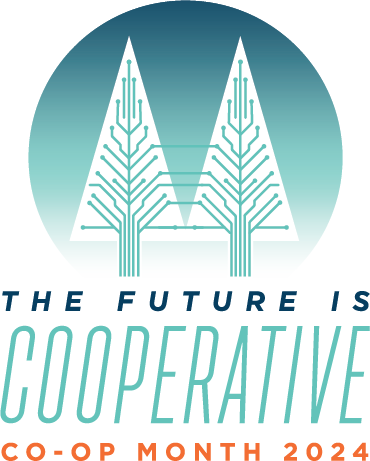This October, the Hanover Co-op is joining over 65,000 co-ops and credit unions across the United States in celebrating Co-op Month, observed nationally since 1964. The theme for 2024, “The Future is Cooperative,” was chosen by the National Cooperative Business Association (NCBA CLUSA) as an opportunity to engage co-op members, customers, employees, and policymakers about what makes co-operative enterprise unique.
As businesses that are owned and controlled by the people who use them to meet their shared needs, co-ops offer an alternative vision for a more inclusive economy that puts people and the future of our planet before profit.
A recent survey by the Neighboring Food Co-op Association (NFCA) found that grocery co-ops across New England and New York State play a key role on supporting our regional economy, selling more than $121 million in local products annually — or more than 25% of sales on average. Taken together, the NFCA includes more than 40 food co-ops and start-ups that are locally owned by 185,000 members and provide employment for over 2,545 people, more than 60% of whom are also members, sharing in the ownership of their local grocery store. From farmer co-ops to worker co-ops, credit unions to mutual insurance, and housing co-ops to energy co-ops, co-operative businesses thrive across the U.S. economy, where 1 in three people are co-op members.

To help celebrate in New Hampshire, Governor Chris Sununu signed a proclamation designating October as Co-op Month, noting that co-ops “play a key role in New Hampshire’s economy through initiatives like affordable housing, healthcare, and sustainable agriculture, improving the lives of many.” The document goes on to “salute co-operatives credit unions and their members for their commitment to our communities and the role they play in serving all of our citizens.”
“The cooperative business model has been deep-rooted in our everyday work for many year,” says Jacob Vincent, Associate Director of Merchandising at the Hanover Co-op Food Stores. “This includes working with cooperative wholesalers, such as Associated Grocers of New England, worker-owned cooperatives such as Equal Exchange, and partnership with food co-ops across the country through our relationship with National Cooperative Grocers. Looking to the future, we desire to grow both current and new cooperative partnerships in our business. We are setting goals and tracking metrics for this growth and focusing our marketing and promotional strategies on cooperative brands. For Co-op Month, we will highlighting a local bakery, Covered Bridge Cookies, that has recently organized as an employee-owned cooperative.”
“Co-operatives make a big difference in our local communities,” said Erbin Crowell, NFCA Executive Director and a member of the Board of Directors of NCBA CLUSA. “But many people are surprised by how our movement and business model is also recognized around the world.”
For example, the United Nations General Assembly recently declared 2025 the second International Year of Co-operatives, acknowledging the contribution of the movement to the Sustainable Development Goals (SDGs) and the urgent need to build a more inclusive, resilient, and global economy. Around the world, around 1 billion people are co-op members, and 10% of the world’s population is employed by co-operatives. Because they are controlled by the people who use them to meet their needs, co-operatives are rooted in their communities.
“The decision by the General Assembly could not be timelier. The innovative contributions of co-operatives for sustainable development will be crucial for accelerating progress in achieving the Sustainable Development Goals as we approach 2030,” said Li Junhua, Under-Secretary-General of the United Nations Department of Economic and Social Affairs. “The second International Year of Cooperatives will be an opportunity to mobilize all stakeholders to support and expand co-operatives everywhere, strengthening their contributions for a better world.”
Find the following cooperatively produced products on the shelves at the Hanover Co-op’s Food Stores (please note, this list is always changing, and not necessarily exhaustive): Florida’s Natural Premium, Organic Valley, Alvarado St. Bakery, Ocean Spray, Land O’Lakes, Welch’s, Sunmaid, Blue Diamond, Aura Cacia, Tillamook, Cabot Creamery Cooperative, Cavit, Riunite, Frontier, Simply Organic, Castello, Ermitage, Long Clawson Dairy, Katalyst Kombucha, Real Pickles, Rabble Rouser, Equal Exchange, Pachamama, Deans Beans, Las Lilas, Covered Bridge, Kerrygold, Moncaro, Vecchia Cantina, and La Riojana.
For more information on Co-op Month and resources on co-operatives, please visit https://nfca.coop.
Rebecca White is the Co-op’s Associate Director of Cooperative Identity.

